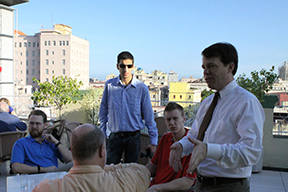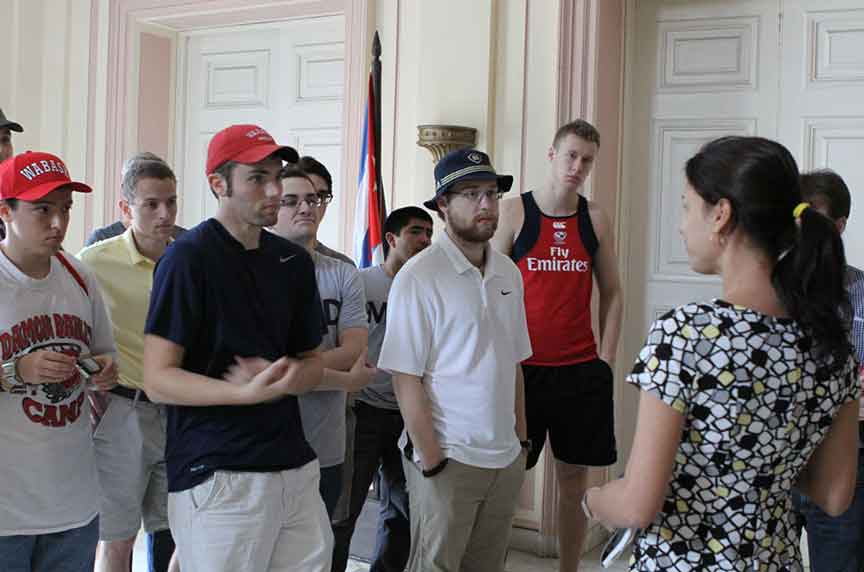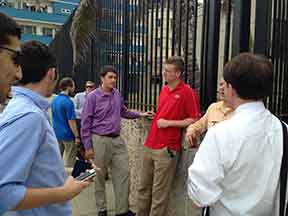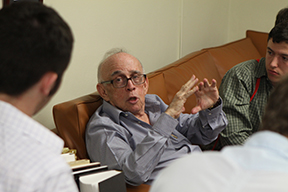Wabash College prides itself on instilling critical thinking skills in its students. Those skills and talents were put to the test when Dr. Ethan Hollander led a political science class on an Immersion Learning trip to Havana, Cuba and Miami Florida over Thanksgiving Break.
The class was accompanied by Spanish Professor Dan Rogers, who had traveled with Hollander to Cuba about a year earlier to make the necessary plans for the immersion trip.
 While Cuba welcomes about two million foreign tourists a year, it’s still rare for Americans to visit because of the embargo that’s been in place for over 50 years. And it’s rarer still for “tourists” to ask the tough questions while in Cuba that the Wabash students asked in meetings with institute leaders, university students, and people on the street.
While Cuba welcomes about two million foreign tourists a year, it’s still rare for Americans to visit because of the embargo that’s been in place for over 50 years. And it’s rarer still for “tourists” to ask the tough questions while in Cuba that the Wabash students asked in meetings with institute leaders, university students, and people on the street.
Indeed, Havana is set up for tourists from Canada and Europe who flock to the country for good rum, great cigars, and sugar-white beaches. Tourism is driving the Cuban economy, and the state manages the sector carefully.
 The Wabash students were led around the city by William Burrowes, a native Cuban representing the tour company Amistur. Burrowes is passionate about his homeland, and like many Cubans, he sees America as his nation’s biggest problem. “There are people dying in Cuba because of the blockade [embargo],” he said. “We can’t get the medicines we need and we can’t get food. The impact of the blockade is not just on Cuba, it’s on all of the countries that choose to do business with us.”
The Wabash students were led around the city by William Burrowes, a native Cuban representing the tour company Amistur. Burrowes is passionate about his homeland, and like many Cubans, he sees America as his nation’s biggest problem. “There are people dying in Cuba because of the blockade [embargo],” he said. “We can’t get the medicines we need and we can’t get food. The impact of the blockade is not just on Cuba, it’s on all of the countries that choose to do business with us.”
While on the island, Wabash students visited historical sites like Revolution Square, the Museum of the Revolution, and the fort from which the Spanish fought off the British more than 100 years ago.
.jpg) The students also visited the Casa de las Americas, a stunning museum dedicated to Latin American art in all its forms, and a whole street dedicated to Afro-Cuban culture and art at Callejon de Hamel.
The students also visited the Casa de las Americas, a stunning museum dedicated to Latin American art in all its forms, and a whole street dedicated to Afro-Cuban culture and art at Callejon de Hamel.
In addition to the tours, Wabash men met with a Cuban economist, Esteban Morales, to discuss the country’s struggling economy, its dual currency system, and how and why citizens can only survive if they have multiple jobs. Cuba, he said, is open to limited foreign investment, but — and this is the problem — on Cuba’s terms.
“We would like to maintain our free public health and education programs,” said Morales. “These are areas where we do not want foreign investment. Foreign investment must meet the needs of all sectors of the Cuban economy — conveniently — and meet the needs of the social party.”
Later Wabash students met with officials from the University of Havana to learn about Cuba’s free university system that attracts students from all across Latin America and exports large numbers of doctors and scientists to third world and developing countries.
 At the Cuban Institute of Friendship with the Peoples, Wabash students heard from Leima Martinez about Cuba’s efforts at people-to-people relationship-building. Students quizzed her on a range of topics — from dissent to religion, and from the rise of women to the embargo, which Ms. Martinez also described as a “blockade.”
At the Cuban Institute of Friendship with the Peoples, Wabash students heard from Leima Martinez about Cuba’s efforts at people-to-people relationship-building. Students quizzed her on a range of topics — from dissent to religion, and from the rise of women to the embargo, which Ms. Martinez also described as a “blockade.”
“We have 500 years of male-centered society here in Cuba and it’s very hard to change minds,” Martinez said. “This institute and its promoters are in the business of changing minds, one person at a time.
“Young people are driving change in Cuba. There are lots of women and young people in our national assembly, and gradually we are seeing the development of small family businesses. These small businesses, like cafeterias and taxi companies, are developing our communities. But they now have to pay taxes, and that’s a whole new idea here. The only people who are paying taxes in Cuba are people who own small businesses.”
 Finally, the Wabash men were permitted entrance to the highly secure U.S. Interests Section building. America doesn’t have an embassy in Cuba, and the Interests Section functions much like one — processing visa applications and repatriating people. There they met with Ed Porner of the Coast Guard, who has lived and worked in Cuba for more than a year.
Finally, the Wabash men were permitted entrance to the highly secure U.S. Interests Section building. America doesn’t have an embassy in Cuba, and the Interests Section functions much like one — processing visa applications and repatriating people. There they met with Ed Porner of the Coast Guard, who has lived and worked in Cuba for more than a year.
He described the work of the USINT, which operates under the umbrella of the Swiss Embassy, as focused on the rule of law, human rights, and open economic and communication systems. He also provided an American take on what the students had heard from Cubans throughout their time in the country.
On Thanksgiving Day, the class returned to Miami Beach, where students spent the next three days learning about issues and concerns of Cuban Americans, some of whom left the country in exile at the time of the revolution.
After a walking tour of the Little Havana neighborhood in Miami (where flags from Cuba and the USA fly), the class visited the Institute for Cuban and Cuban American Affairs at the University of Miami and met with the Institute’s director, Jaime Suchlicki.
Suchlicki was exiled from Cuba in 1958, returned a year later, and was recruited to work in the labor ministry. He saw what was happening under Fidel Castro and left the country in 1960. He has not returned.
 For over 90 minutes, Suchlicki took questions from Wabash students, and provided the Cuban-American perspective. “The cause of Cuba’s problems is not the embargo; it’s the system,” he said. “It didn’t work in Eastern Europe or the Soviet Union, and it doesn’t work in Cuba. It’s a disaster.”
For over 90 minutes, Suchlicki took questions from Wabash students, and provided the Cuban-American perspective. “The cause of Cuba’s problems is not the embargo; it’s the system,” he said. “It didn’t work in Eastern Europe or the Soviet Union, and it doesn’t work in Cuba. It’s a disaster.”
Suchlicki reinforced what the students had discovered for themselves while in Cuba: that Cubans have state jobs that pay them in Cuban pesos and side jobs related to tourism that pay them in Convertible pesos, which are far more valuable. He also said that many in Cuba survive by stealing cigars and rum from factories to sell on the black market or to foreign tourists.
“Another myth they [Cubans] would have you believe is that American tourists can change the system,” Suchlicki said. “Like some guy from Iowa is going to wave a magic wand and change the whole system there. It’s not going to happen because there’s nothing to invest in in Cuba. Large international companies are looking for a legal system that will protect them and their interests. And that doesn’t exist there.”
.jpg) A visit to the studios of WLNR, Miami’s National Public Radio affiliate, hosted by Wabash alumnus Tim Padgett ’84, provided yet another perspective. Padgett has covered Latin America for Newsweek and Time magazines for nearly three decades, and effectively helped the students use their critical thinking skills to cut through the propaganda and rhetoric from both Cuba and Miami.
A visit to the studios of WLNR, Miami’s National Public Radio affiliate, hosted by Wabash alumnus Tim Padgett ’84, provided yet another perspective. Padgett has covered Latin America for Newsweek and Time magazines for nearly three decades, and effectively helped the students use their critical thinking skills to cut through the propaganda and rhetoric from both Cuba and Miami.
“When you’re a journalist covering Cuba, if you can write something that makes Havana and Miami mad at the same time, you know you’ve done your job,” Padgett said.
“Obama has been tough on Cuba — he’s not an easy scapegoat like the last administration because he’s lifted the restrictions on Cuban-American travel. The Castros’ power is fed on being able to blame the United States and the embargo for everything that’s wrong with the country. It’s becoming obvious that the system is at the root of their problems.”
The 14 Wabash men who spent a week studying Cuba and Cuban-American politics and culture had their eyes opened — to the wonders and beauty of a mysterious island and to the problems and corruption that exist there. If immersion trips are supposed to provide 24/7 teaching and learning opportunities, this one was an enormous success. That it also forced the students to listen carefully and hone their critical thinking skills in important ways was even more impressive.